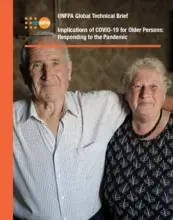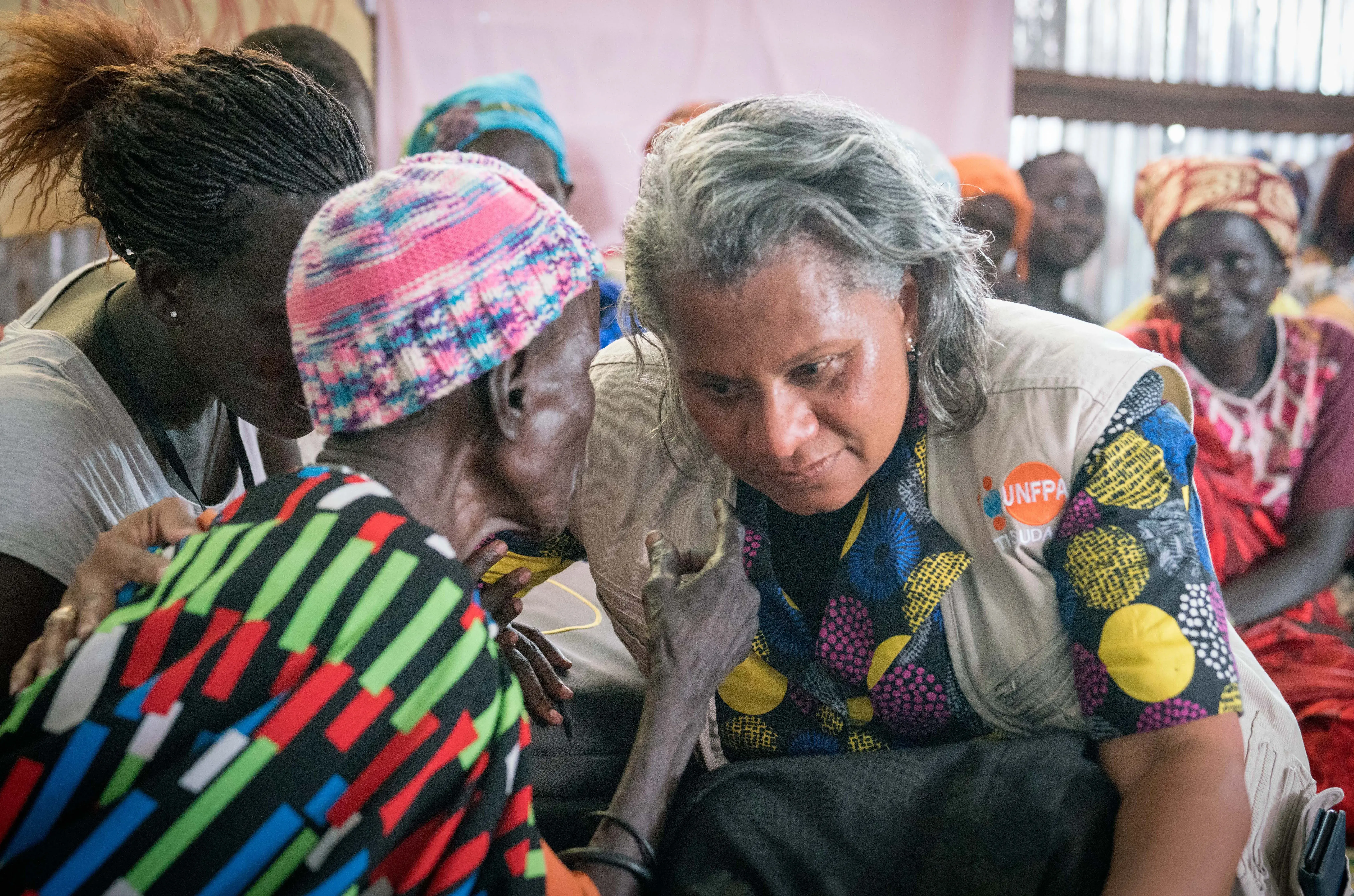Blog by Dr. Julitta Onabanjo, UNFPA Regional Director for East and Southern Africa
February 2021
I grew up knowing that in the many communities of my birth place in Nigeria, female genital mutilation (FGM) was prevalent. Today, 20 million girls in Nigeria have undergone FGM and the majority (82 per cent) were cut before the age of 5 years.
For those communities where this practice is a long-held tradition, it is difficult to understand the global outcry against this harmful custom.
Conversely, in communities where female genital mutilation is not practised, it is equally hard for us to understand why such a horrific violation of a girl’s bodily autonomy, integrity and fundamental human rights should even exist.
For Maalika from Ethiopia and Sharleen from Kenya, both of whom suffered serious consequences as a result of the insidious practice, the reason why FGM should be eliminated is crystal clear.
Maalika, from Ethiopia’s Afar region, was infibulated (almost complete closure of the vaginal orifice by cutting and closing the labia to create a skin seal, with a small opening left for the passing of urine and menstrual blood) as a child and consequently endured a long, obstructed labour that caused an obstetric fistula. Now she cannot control her urine and faeces, which leak continuously through her vagina. “I was lucky that my baby survived. I will not circumcise my daughter,” she said in response to her experience.
I was lucky that my baby survived. I will not circumcise my daughter.
Sharleen, a fearless and powerful Kenyan girl, sought help from her teacher when her father tried to force her to undergo female genital mutilation when she was in primary school. To escape this fate and complete her primary education, she knew her only option was to leave home. Today, Sharleen is enrolled in secondary school and has become a community mobilizer in the fight to end FGM.
Maalika and Sharleen’s contrasting testimonies show how far we have come in the fight to end the harmful practice of FGM, and also how much more work there is still to do, particularly as we see many gains in sexual and reproductive health and rights being reversed by the COVID-19 pandemic.
As a continent, Africa has developed progressive policies and legal frameworks on ending FGM. Aspiration 6, Priority 51 of the African Union Agenda 2063 aims to eliminate all forms of gender-based violence and discrimination against women and girls. Political leaders are playing their own critical part. The African Union has appointed the President of Burkina Faso, Roch Marc Christian Kaboré, as the Champion for the elimination of FGM, and launched the Saleema initiative in 2019.
Citizens, too, are mobilizing. For example, the percentage of women who think FGM should be stopped almost doubled – from 33 per cent to 60 per cent – in 24 years from 1994 to 2017.
At the Nairobi Summit, the commemoration of the 25th anniversary of the International Conference on Population and Development, governments and civil society renewed and made new commitments to eliminate all harmful practices, including FGM. At the highest political level of the Summit’s host government, President Uhuru Kenyatta made a bold commitment to ending FGM in Kenya by 2022. One clear target of Sustainable Development Goal 5 is to eliminate all harmful practices, including FGM. Aligned with this is UNFPA’s transformative result of ending gender-based violence and harmful practices, including FGM, by 2030.
Yet, despite stronger accountability towards eliminating FGM, we continue to face hurdles to our ambition. The medicalization of FGM, resurgence of the practice during the COVID-19 pandemic, and increased frequency of cross-border FGM in East Africa are significant barriers.
The COVID-19 pandemic has sharpened our resolve to protect 4 million girls and women around the world at risk of FGM each year.
The “medicalization” of FGM refers to a situation in which FGM is practised by any category of health-care provider, whether in a public or a private clinic, at home or elsewhere. As UNFPA notes, FGM can never be “safe” and there is no medical justification for the practice.
While we have made much progress, the COVID-19 pandemic has shown us that what has been achieved to date is fragile and that our efforts to end FGM must be sustained and accelerated. There have been reports of increased FGM with COVID-19 related lockdowns hiding the cutting of girls. COVID-19 related school closures have also been taken as an opportune time to circumcise girls, as they have "time to heal".
Far from dampening our ambition, however, the COVID-19 pandemic has sharpened our resolve to protect the 4 million girls and women around the world who are at risk of FGM each year.
As political traction and political will to eliminate FGM sees positive movement, Ethiopia, Kenya, Tanzania, and Uganda have developed national legislation to prevent and address FGM. However, across the four countries there are no harmonized sub-regional provisions. Cross-border FGM is enabled by this gap, as penalties vary from high to low, depending on the country. A recent study showed that 71 per cent of women and girls from Somalia, Ethiopia, Tanzania and Uganda who underwent FGM travelled to Kenya for this purpose.
There is a need for a robust regional law that prohibits FGM by harmonizing the offences and penalties across countries.
Not everything we inherit is a gift to be passed on,
we gain more than we lose, when we choose to move on.
In October 2018, UNFPA, UNICEF and the AU co-hosted the International Conference on Female Genital Mutilation in Burkina Faso, with the theme ‘Galvanising political action to accelerate the elimination of female genital mutilation by 2030’. Kenya, Uganda, and Tanzania agreed to address the challenge of cross-border FGM, leading to the first-ever Regional Inter-Ministerial Meeting to End Cross-Border FGM and a year later the signing of a declaration to this end. The UNFPA-UNICEF Joint Programme on Female Genital Mutilation, the largest global programme to accelerate its abandonment, has supported the plan of action for this declaration.
The Spotlight Initiative, a global partnership between the European Union and the United Nations, represents the single largest investment in ending violence against women and girls and harmful practices in Africa, with momentum gaining to do so on the continent by 2030. A critical building block to eliminate FGM is engaging men and boys. As a component of the Spotlight Initiative, the UN is engaging male traditional leaders as game changers in preventing and ending FGM. The Council of Traditional Leaders of Africa (COTLA) has demonstrated the power that leaders have to influence their communities to take a stand against FGM and harmful practices. And we are seeing a growing number of them banning harmful practices.
This year, at the Global High Level Event to Accelerate Investment and Action to End Female Genital Mutilation, a young African activist, Judith Kehinde shared a poem:
“Not everything we inherit is a gift to be passed on,
we gain more than we lose, when we choose to move on.”
It is time to UNITE around proven strategies, FUND them adequately and ACT.
Our march for sexual and reproductive health and rights, including the right to bodily autonomy, continues.
We choose to move forward. Let’s do this together.





